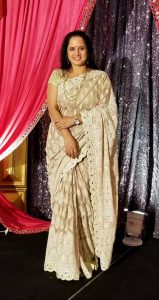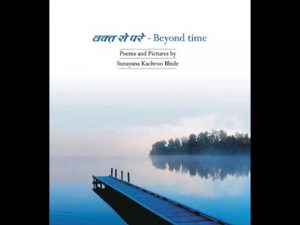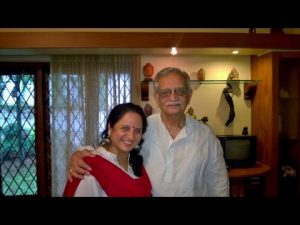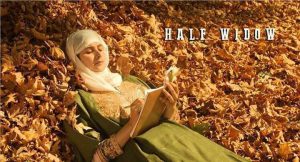“I do not think that one can plan a creative transition, it just happens..” says Sunayana Kachroo, poet, lyricist, dialogue writer
Born and brought up in the idyllic Kashmir, Sunayana Kachroo is one of those poets and creative artists of the Indian Diaspora whose poems, lyrics and stories are replete with the tenderness and nostalgia of an emotionally fraught Kashmir. Her first poem was published at the age of 15, and since then, through her poetic journey she has explored different forms of poetic expressions like Kavita, English Poems, Nazms and Dohe. Through heavily influenced by the lyrical microcosm of Gulzar Saab, she has created her own niche, endorsed by celebrities, filmmakers and theater personalities. Her oeuvre has been vast and impressive, encompassing poetry and lyrics, dialogue writing for films, collaboration with musicians et al. Sunayana’s short film “In search of America – Inshallah” was selected for the Short Film Corner at Cannes 2015. She has also been featured as a poet and panelist for prestigious events, including the Bangalore Literature Festival 2014, Harvard University’s Annual Poetry Reading event sponsored by South Asia Institute, South Asian Women’s Conference, Waltham, MA, among other places. In a tete-a-tete with Sunayana, we talk about her journey as a poet, lyricist and creative artist. 
Lopa Banerjee: Hello Sunayana, it feels great to have you here. From your first poetry collection titled Waqt Se Pare [Beyond Time] to being chosen as the Star Performer for the upcoming New England Choice Awards, it surely has been a heady journey for you! Carl Sandburg had once famously said: “Poetry is an echo, asking for a shadow to dance.” How did you get the calling of that echo, that muse, and how do you perceive this shadow dance of yours, evolving and gaining momentum year after year?
Sunayana Kachroo: When we sow a seed, we do not see the sapling for a while and then one fine day, it fights the gravity enough to come out. For someone who doesn’t understand this process they may feel that it happened overnight but we know that is not the case. Although, I did publish my book in 2013, I have been writing on and off for a while. My father had a huge library of books and I had “A Tale of two cities” in my hand even before I could walk. There was a lot of music in the house, that I feel must have been marinating somewhere in my subconscious. Music also helped me escape the pain that I saw all around me when the migration of Kashmiri Pandits happened in 1990. Most of my memories have songs attached to them. I have been a big fan of Jagjit Singh ji, Madam Mohan ji’s compositions, RD Burman-With Gulzar Saab and Gulzar Saab’s poetry.
Lopa Banerjee: Whatever much I know about your journey from the idyllic valleys of Kashmir to Boston, the cultural epicenter of the east coast of America, it is about dramatic transitions. With a computer science degree from the Pune University, India, the transition as a software analyst in the US might still be considered as a known and expected trajectory. However, I must say that your transition from a software professional to a poet and creative writer, a lyricist with the mission to promote poetry is a unique and exceptional once. When would you say you felt this transition from within, and how did you go about it?
Sunayana Kachroo: I do not think that one can plan a creative transition, it just happens. I moved to the United States in 2000, hoping to work here for a couple of years and then move back to India. Life had other plans and here I am 17 years later, telling you that I never feel settled anywhere. Home is no longer a place, it is in this moment of transition. In the year 2010, a couple of months after my son was born, I was waiting in the parking lot of a restaurant and I wrote my first few lines, I shared those on Facebook. A few of my very generous friends appreciated and encouraged me to write more. I think I have to thank Mark Zuckerberg a lot.
Lopa Banerjee: If I am not wrong, your journey as a featured poet in literary festivals began with Bangalore Literature Festival 2014, after your debut collection of poetry was brought out. Thereafter, you have been part of many literary congregations in India, and also in the US. The general perception about most popular book and literature festivals is that they are red carpet events for established and celebrity authors/poets. Would you say they generally give adequate support to underrepresented writers, or creative artists with an impressive body of work? Or is it all only about the glitterati among the literati with strategized events which are more ‘saleable’ than anything else?
Sunayana Kachroo: My journey as a featured poet started here in the US, with an organization called Hindi Manch, that got the ball rolling for me, I am honored to have been given the opportunity to recite at BLF 2014 alongside famous Punjabi poet Nirupama Dutt. However, I agree with you that the big literature festivals look beyond your LQ (Literary Quotient) and probably feature poets who can bring audience as well. It is sad and discouraging for the upcoming poets like me because I feel that they need to create a platform to launch new voices too, not just those who have already made their name in this field. There are many publication houses that come to these events and it would be great to have a program for the first-time writers as well. Not everyone who writes well can afford to self-publish.
Lopa Banerjee: From writing poetry to writing lyrics for celebrity singers including Sonu Nigam, Jasraj Joshi, Anuradha Palakurthi, and Hrishikesh Ranade, how did this journey evolve? Did the ‘musicality’ or lyricism in your poetry provide you the impetus to pen down the lyrics of the songs, as a conscious exercise, or was it yet another ‘spontaneous overflow of powerful emotions’, in Wordsworth’s words, that eventually shaped your journey as a lyricist? How do you envision your journey as a poet writing books as a solitary journey, vis-à-vis, a lyricist writing songs to be performed for a much wider platform?
Sunayana Kachroo: Lopa, to tell you the truth, When I first started writing, I never thought that we could actually create songs out of it. At the insistence of my husband’s cousin Suchitra, I decided to approach music director trio-Jasraj, Hrishikesh, Saurabh. They took two songs out of my book and composed two amazing songs “Tera Haath” and “Pyar mein nadaan”. In fact, they didn’t ask me to even change one word in these poems. When I heard the songs for the very first time, I realized the power of music and how words and music together can create a soulful experience. 
Sonu ji’s song was for a movie and again I had written the lyrics first and then he composed and sang it. Director Danish always gives me the freedom to think about the lyrics while we are at the inception of writing for the movie, so I am involved with the character from the very beginning.
My experience with Anuradha ji has been very interesting because we created different pieces every time, starting from a poem converted into song to a tune on which I wrote lyrics, so in that sense I learnt a lot too. We recorded at Yash Raj studios as well, which was a dream come true for me.
Lopa Banerjee: Your feelings as an expatriate Kashmiri, the turmoil, the yearnings and the Sufi spirituality comes across in your poems and lyrics very spontaneously. How would you say Kashmir is invoked in your creative writings as your muse, and how has your poetic persona and emotions been shaped by the physical and political landscape of Kashmir, your homeland?
Sunayana Kachroo: Distance makes heart grow fonder- I guess that is how I can describe my love for Kashmir. When it was all available to me and all around me, I didn’t even care to talk in Kashmiri. English was a much “cooler” language and an equalizer in many ways. You talk in English …you have arrived. However, when I moved to the USA, I started craving for Hindi/Urdu and Kashmiri as well. I would hunt for every ounce of Kashmiri that was available anywhere. I forced myself to speak to Kashmiris in Kashmiri and try to speak in Hindi and Urdu as much as possible. “Hindi Kavita” channel has been helping a lot too, bringing classic poems and poets back in “fashion”. Sufi or spirituality is a mindset, either you have it or you don’t ..I have never thought of myself as a Sufi writer, I write what comes to me. In fact, I would love to write item songs, I recently penned one for Anuradha ji and realized that it is easy to write about sky but very hard to write about eyes. Gulzar saab’s abstract writing has been of great influence to me, in fact I owe a lot to his poetry. There is a certain kind of motion in his words, even in his most still poems, there is a promise of movement. There is talent but most importantly there is a lot of craft…hand picking and pruning of words too. “ bahut din ho gaye teri aawaz ki bacuhaar main bheega nahi hoon main” how beautiful is this verse. That is the magic of Gulzar saab, “woh nabz pakad letein hain..baaqi ke jism tatoltein rehtein hain”.
Lopa Banerjee: From writing poetry to dabbling in lyrics to meandering in film writing, has your journey been an organic one, you would say, or did just one pursuit make way for the other and you listened to your gut feelings when you ventured into each of them? Can you share with us how it feels to be at this nonstop crescendo of creating words, images, characters and their inner sojourns?

With Gulzar Saab, her inspiration
Sunayana Kachroo: One word would be- Chaos…lots of it. I live in a world of constant chaos, there is unfortunately no set pattern for writing. The only thing I have been able to do is that I have promised myself that I will treat writing as I used to treat my job-Show up. So sometimes I wait ….and wait…..and not a word comes out, but I try to keep my promise.
Lopa Banerjee: When it comes to your foray into scriptwriting/dialogue writing for films, I would definitely want you to share some words about your association with Renzu Films, based in Los Angeles, and director Danish Renzu, about which you have spoken briefly in your other interviews. Did the Kashmir connections between you both work as the bridge, resonating your thoughts with his in terms of storytelling, which explores the pangs and struggles of Kashmiri people?
Sunayana Kachroo: Kashmir connection definitely works as a bridge. Language, food, locations– all these have great influence on your life. We are the artists that are born out of Kashmir’s womb and pain, we understand life in a different way. Danish has been more like a mentor and a collaborator. I had never seen a movie set, had never seen how a script looks like, what is a dialogue, character, scenes. He has groomed directed my creativity in the right direction, he is a professional and we do not let our political and personal influences impact our professional association.
Lopa Banerjee: In context of your association with Renzu films, we must talk about the much-awaited film Half Widow under their banner for which you have written the dialogues and the song lyrics. I have already read that the film has been inspired by Parveena Ahangar, the Iron Lady of Kashmir, an advocate for heartbroken women of Kashmir throughout the political conflict that the state has witnessed. Can you share with us the connotation of its title and how was the idea of the story expanded in its screenplay?
Sunayana Kachroo: Half Widow was definitely inspired by the journey of Parveena ji. However, there are half widows in Bangladesh, Baluchistan and many other conflict zones around the world. Neela happens to be in Kashmir. I have written dialogues and the song for this movie, however the real challenge for me was when we decided to write a lot of Kashmiri poetry. I had to really read a lot and consult Kashmiri scholars to make sure what we are presenting makes sense. I hope our effort is appreciated. 
Lopa Banerjee: How has your experience been like, in the sets of the film under production in Los Angeles? While looking at the story developed through the lens of the female protagonist Neela, what were the emotions triggered in you as an expatriate Kashmiri and also a sensitive poet and lyricist? I would quote a few lines here from an article ‘The Half Widows in Kashmir’ published in ‘The WVoice’. “While men in conflict zones are celebrated, decorated, and revered for their heroism, women and children are often just referred to as the bystanders of the discord.” How does the protagonist’s journey illustrate it in the film?
Sunayana Kachroo: I do not see Neela just as a Kashmiri woman, I see her as a human being experiencing loss and tragedy, in despair, lonely, hopelessness and her journey to self-realization and then to empowerment. There are instances where I cried even when I was writing the dialogues…her love for her younger brother is almost motherly or probably greater, I relate to that in my own life.
Neela’s struggle is education, my struggle is probably something else…However we all are looking for personal remedies to universal pains…Our source of pain may be different but our songs of overcoming are universal.
Lopa Banerjee: You are also working on producing an anthology of stories on Kashmir, chronicling the tragedy, turmoil, angst and also, I believe, the nostalgia of being a part of an idyllic landscape, now war-torn and striving to pick up its broken pieces. Can you share a few words about your experience with this anthology, and what would it offer its readers?
Sunayana Kachroo: Lal Ded, Arnimaal, Habba Khatoon, Roop Bhawani, Kashmir has been very blessed to have some many bhakti , sufi and mystic poetesses. After the political unrest and the displacement of pandits, I felt that we needed to bring that ethos back. ‘Pottalav- Echoes of Kashmir’ aims to be that medium. I am coediting this with a renowned poet and mentor to many -Dr Santosh Bakaya ji. It is an honor to work with her.
Lopa Banerjee: Thank you so much for your time and really enjoyed your insightful answers, Sunayana! Wish you all the very best in this journey of yours.
Lopa Banerjee is a poet, author, translator and editor currently based in Dallas, TX.



